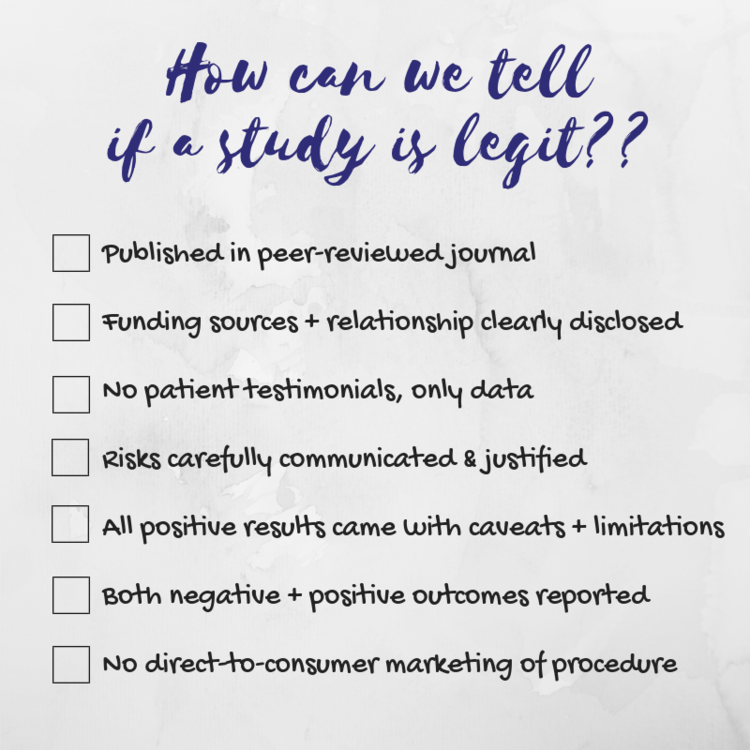stem cell therapies
Stem cell biology and regenerative medicine are exciting areas of scientific research, with lots of buzz in the media everyday. But unfortunately the great hope stem cells bring to the future of medicine has been matched by a dangerous amount of hype, with many unproven and unregulated centres led by naturopaths and MDs alike offering stem cell "procedures" that have not been properly tested for safety or efficacy.
Even as a researcher with over 8 years of experience studying stem cell biology & regenerative medicine, it can be difficult to read between the lines and figure out who’s really there for your health and who’s just in it for the money. Companies selling these unproven procedures will feign legitimacy by having smiling (dishonest) MDs on their website, graphs (that seem to make sense from a quick glance), (shady) board certifications, publications (in non-reputable/fake scientific journals), and may even be operating under legal loopholes that place fewer regulations on procedures deemed surgical.
Please do not hesitate to be in touch if you have further questions, though please note none of the opinions on this page or in direct correspondences should constitute medical advice.
Expert panel discussion about the hype and hope of stem cells & regenerative medicine, moderated by Dr. Yammine and hosted by RCIScience.
What you need to know now
First, please note that there is no one best stem cell for everything -- there are many different types of stem cells, and they can be sourced from different tissues & animals. But in any case, each stem cell type and source must be rigorously tested for long-term safety and efficacy … and for every specific use case. And there are only a few ways stem cells are currently routinely used to treat diseases.
The best-defined and most used stem cell treatment is blood stem cell transplantation (eg. bone marrow transplantation) to treat blood and immune disorders, or to rebuilt the blood system after treatments for some kinds of cancers.
Some diseases or injuries related to bone, skin, and the cornea (part of the eye) can be treated by grafting or implanting tissues, and the healing process relies on stem cells within that implanted tissue.
The above are clinically proven to be safe and effective, and are widely accepted by the medical community. There are some legitimate clinical trials beyond what's been listed above, but the majority of "clinical trials” and “experimental procedures” being marketed are unproven & unsafe.
Quick checklist for assessing claims about a specific stem cell procedure, made by Samantha Yammine, PhD. Opinions her own and do not constitute medical advice, please consult your family health team.
More detailed general rules of thumb to help you navigate stem cells on the Internet:
Any legitimate clinical trial would have a fairly regular and consistent publication trail of incremental studies that may seem redundant
these would likely be published in reputable journals for at least a decade before it’s safe to be used on humans
to make matters more confusing, there are lots of fake journals out there pretending to be real scientific journals >.< … since stem cells are not yet routinely used in clinics, though, any new breakthroughs that are legitimate would be HIGHLY publicized in top journals like: “New England Journal of Medicine”, “Nature”, “Stem Cell Reports”, “Cell Stem Cell”, and “Science”, and in the popular media (like Vox, The New York Times, The Globe and Mail, etc...)
Any clinical trial that’s safe would be associated with a university and/or hospital that you’ve heard of before or you can find lots of information on easily
Risks should be clearly communicated upfront. As stem cells are still mostly experimental, their use in clinical settings is typically very high risk
flashy testimonials from patients on websites are generally a red flag
influencer marketing is typically a red flag as well, especially given the most common stem cell treatments involve bone marrow transplants, which require chemo and are usually a last line of treatment given the high risk
Clinical trials don’t typically cost money to participate in, and any conflicts of interest and financial investors should be clearly stated
Below are some of the most authoritative and reputable resources compiled by experts in the stem cell field.
Please consider reviewing them with your healthcare team before undergoing any procedures related to stem cells.
“Things to consider about clinical trials” by the international society for stem cell research
Many illegitimate stem cell companies will call their procedures a “clinical trial” and even list it on clinicaltrials.gov, so please take the name “clinical trial” with a grain of salt when you see it online. Follow the link above if you are considering a clinical trial, or learn more in general about clinical trials here.
"Nine Things to Know About Stem Cell Treatments" by the International Society for Stem Cell Research
The International Society for Stem Cell Research (ISSCR) is an independent, nonprofit membership organization comprising nearly 4000 members including physicians, stem cell researchers, and industry professionals. They were established to promote and foster the exchange and dissemination of information and ideas relating to stem cells, to encourage the general field of research involving stem cells and to promote professional and public education in all areas of stem cell research and application. Their annual meeting in June is where all of the latest and most sophisticated stem cell research wis discussed by top professionals in the field. Follow them on Twitter for updates.
"Beware the Hype on Stem Cell Breakthroughs" by Prof. Timothy Caulfield
Prof Caulfield's piece in The Globe and Mail cautions against "experimental" aka unproven stem cell clinics, and gives some tips on how to tell the true innovators from those exploiting the latest trends in biomedical research. Timothy Caulfield is a Canada Research Chair in Health Law and Policy, and a world renown researcher on health policy and bioethics, particularly those related to stem cell therapies.
"Selling Stem Cells in the USA: Assessing the Direct-to-Consumer Industry" by Dr. Leigh Turner and Dr. Paul Knoepfler
Dr. Leigh Turner is an Associate Professor at the University of Minnesota Center for Bioethics, and Dr. Paul Knoepfler is a stem cell scientist and communicator who runs a lab at the University of California Davis School of Medicine. Dr. Paul Knoeplfer runs the world renown blog about stem cells "The Niche", which aims to better connect everyone with the latest in stem cell research. The link above will take you to an article Drs. Turner and Knoepfler co-wrote about the prevalence of Internet-based marketing claims of unregulated stem cell clinics in the USA.
“Direct-to-consumer marketing of stem cell interventions by Canadian businesses” by Dr. leigh turner
Dr. Leigh Turner’s 2018 paper on the marketing claims of Canadian businesses engaged in direct-to-consumer advertising of putative stem cell treatments. It was found that, in total, 22 businesses administer stem cell interventions at a single clinical site, four companies operate two clinics each, three businesses each operate three clinics and one business has four clinics. Several Canadian companies marketing stem cell interventions refer their clients to healthcare facilities that appear to be located outside Canada. These companies were not included in the tally of 30 companies and 43 clinics.
“The involvement of Canadian physicians in promoting and providing unproven and unapproved stem cell interventions” by prof. ubaka ogbogu et al.
This paper from 2018 shows that Canadian physicians are the dominant players in the online promotion and provision of unproven and unapproved stem cell interventions, meaning a recommendation from an MD doesn’t suffice for trusting the validity of a stem cell intervention.
“A Letter to joe rogan about stem cells” by stacey johnson for signals blog
The Signals blog posts factual and fun content related to stem cells and cell therapy, and this particular one had an important message on celebrity endorsements of unproven stem cell interventions by science writer Stacey Johnson.
Informed Consent for Stem Cell Interventions by the isscr
A short guide describing requirements for informed consent, regardless of jurisdiction. Any trustworthy professional would follow this procedure, so if you haven’t been asked to give consent in this way by a healthcare provider… think twice.
More questions? Call the Regenerative Medicine Consult Service at 844-276-2003 (toll-free)
This service provides educational guidance and appropriate referrals to research studies and clinical trials in stem cell therapies and other regenerative products.
Indications for a regenerative medicine consult include (but are not limited to) disorders of the heart, liver, pancreas and lungs; systemic diseases; and injuries. Any patient or clinician who has questions about the value of regenerative therapies is welcome to call the consult service.
Patients and health care providers are informed of existing regenerative services at Mayo Clinic. When appropriate, patients are referred to research studies at Mayo Clinic and elsewhere that are actively recruiting participants. In other instances, a subspecialty referral may be made.

